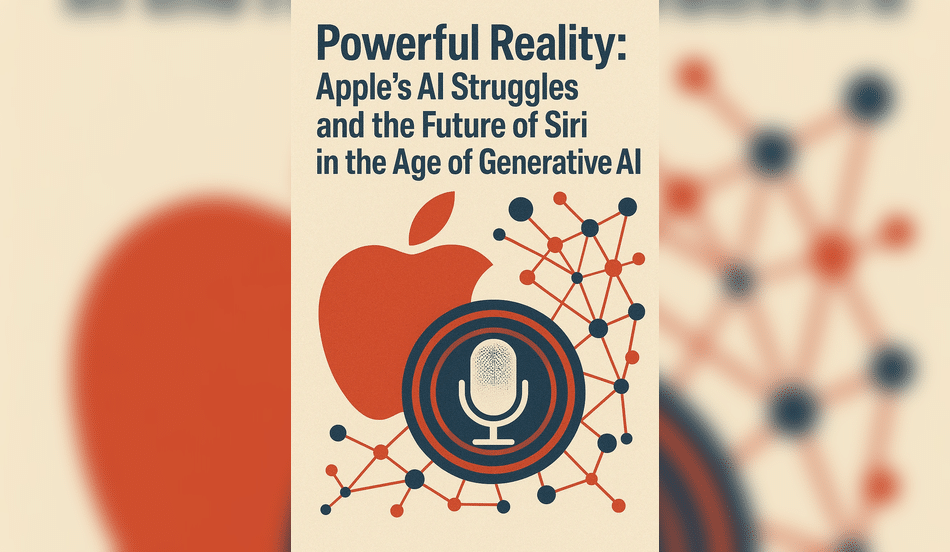In the rapidly evolving world of artificial intelligence, Apple’s journey has been marked by both innovation and hesitation. Apple AI Struggles, encapsulates the challenges the tech giant faces as it navigates the generative AI revolution. This post explores the powerful reality behind Apple’s AI struggles, the future of Siri, and what it means for users and the broader tech landscape.
Table of Contents
The Rise and Stall of Siri
Early Promise and Market Leadership
When Apple introduced Siri in 2011, it was a groundbreaking moment for voice assistants. Siri’s integration into the iPhone set a new standard, and for a time, Apple led the market. However, as competitors like Google Assistant and Amazon Alexa advanced, Siri’s development appeared to stall. The Apple AI Struggles became more apparent as users noticed the gap in capabilities.
Comparisons with Competitors
While Siri was once the face of consumer AI, it now lags behind in natural language understanding and contextual awareness. Google and Amazon have leveraged vast data resources and aggressive AI research to push their assistants forward, leaving Apple to play catch-up. For a deeper dive into the latest AI research, check out OpenAI Research.
Apple Intelligence and the Generative AI Race
Apple’s Approach to AI
Apple has always prioritized privacy and on-device processing, which has shaped its AI strategy. While this approach has benefits, it has also limited the company’s ability to scale generative AI models as quickly as competitors. The Apple AI Struggles are partly rooted in this cautious philosophy.
Generative AI: The New Frontier
Generative AI, exemplified by models like GPT-4, is transforming how users interact with technology. Apple’s recent announcements about integrating generative AI into its ecosystem signal a shift, but the company is still perceived as trailing the leaders. For ongoing coverage of Apple’s AI journey, visit The Verge’s Apple section.

What’s Holding Apple Back
Technical and Organizational Challenges
Apple’s AI struggles stem from several factors:
- Data Limitations: Apple’s commitment to privacy restricts the data available for training large AI models.
- Talent Competition: The global race for AI talent is fierce, and Apple faces stiff competition from companies with more open research cultures.
- Legacy Systems: Integrating advanced AI into existing products like Siri requires overcoming significant technical debt.
Internal Culture and Secrecy
Apple’s secretive culture, while effective for hardware innovation, can hinder rapid progress in AI, where open collaboration and shared research are key drivers of advancement. These internal dynamics contribute to the ongoing Apple AI Struggles.
Build Your AI Dream Team!
Are you hiring for AI roles?
Post your job openings on WhatJobs and connect with top talent in the field. Let us help you build your AI dream team and stay ahead in the age of generative AI.
User Frustration and Mixed Reviews
Feedback from the Apple Community
Many users express frustration with Siri’s limitations, especially when compared to the fluidity of Google Assistant or Alexa. Reviews often highlight issues with accuracy, context, and integration with third-party apps. The phrase Apple AI Struggles frequently appears in user forums and tech reviews.
Impact on Brand Perception
While Apple’s brand remains strong, persistent AI shortcomings risk eroding user trust and loyalty. The company must address these issues to maintain its reputation for innovation.
Apple’s AI Investments and Strategic Shifts
Recent Acquisitions and Partnerships
Apple has quietly acquired several AI startups and increased its investment in machine learning. These moves suggest a renewed focus on overcoming the Apple AI Struggles and catching up in the generative AI race.
Strategic Shifts in AI Development
There are signs that Apple is opening up to more collaboration and external partnerships, a necessary step to accelerate progress. The company’s recent developer conferences have highlighted new AI features and tools for third-party developers.
The Road Ahead
Opportunities and Risks
Apple’s future in AI depends on its ability to balance privacy with innovation. The company’s vast resources and loyal user base provide a strong foundation, but the pace of change in generative AI means there is little room for complacency. Addressing the Apple AI Struggles will require bold moves and a willingness to adapt.
What Users Can Expect
In the coming years, users can expect more intelligent and context-aware features across Apple devices. However, the timeline for closing the gap with competitors remains uncertain.
Key Points
- Apple AI Struggles are rooted in privacy priorities, technical debt, and internal culture.
- Siri’s early lead has faded as competitors advance in generative AI.
- Recent investments and strategic shifts signal a renewed focus on AI.
- User frustration highlights the need for rapid improvement.
- The future of Siri and Apple’s AI depends on balancing privacy with innovation.
FAQ: Apple AI Struggles
What are the main reasons behind Apple AI Struggles?
Apple AI Struggles are primarily due to the company’s focus on privacy, limited data for training, and a secretive internal culture that slows down AI development.
How is Apple addressing its AI struggles?
Apple is investing in AI startups, increasing research, and shifting its strategy to be more open and collaborative, aiming to overcome the current Apple AI Struggles.
Will Siri catch up with other AI assistants despite Apple AI Struggles?
While Apple is making efforts to improve Siri, the outcome depends on how quickly it can address the underlying Apple AI Struggles and innovate in generative AI.
Where can I learn more about Apple AI Struggles and the future of AI?
For more information, follow The Verge’s Apple coverage and OpenAI Research. For career opportunities, visit WhatJobs.




